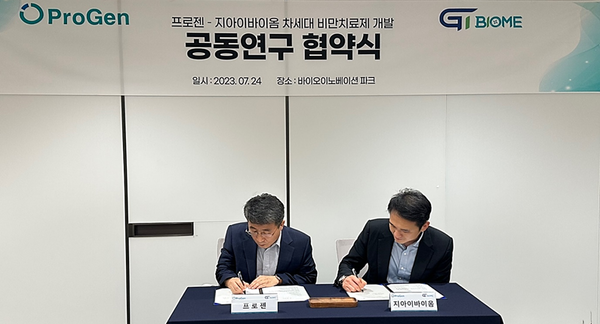GI Biome said on Tuesday that it signed a memorandum of understanding (MOU) with ProGen, a company with a multi-target antibody platform, to develop a next-generation obesity treatment.

Accordingly, both companies plan to conduct joint research on the combination of Progen's obesity drug candidate and GI Biome's anti-obesity and metabolic disease microbiome drug to develop next-generation obesity drugs that are safe and maximize abdominal obesity and visceral fat reduction.
ProGen is SL Metagen are co-developing PG-102, a GLP-1, and GLP-2 dual-acting anti-obesity drug, a substance that minimizes the side effects of existing anti-obesity and diabetes drugs while maximizing therapeutic effects. The drug also showed similar weight loss effects in animal studies compared to Eli Lilly’s Mounjaro (ingredient: tirzepatide) which is expected to be launched soon. Last month, the company filed an IND with the Ministry of Food and Drug Safety (MFDS) and expects to start clinical trials in the fourth quarter.
Meanwhile, GI Biome has secured strains for anti-obesity and metabolic disease treatment that show improved weight loss, appetite suppression, immune regulation, and insulin resistance and is also developing an obesity treatment.
The obesity drug market is growing exponentially as GLP-1 analogs, which have been recently recognized as a treatment for diabetes, have shown their effectiveness in weight loss and have been launched as drugs for obesity treatment.
However, GLP-1 analogs cause weight loss through appetite suppression and decrease body fat and musculoskeletal mass. Moreover, it exhibits a yo-yo phenomenon whereby patients regain weight when the drug is discontinued, highlighting the need for innovative therapies that can overcome these limitations.
"Through joint research on the combination of our drugs, we expect to propose a breakthrough treatment that can show safe and long-term effects,” said an official GI Biome.

